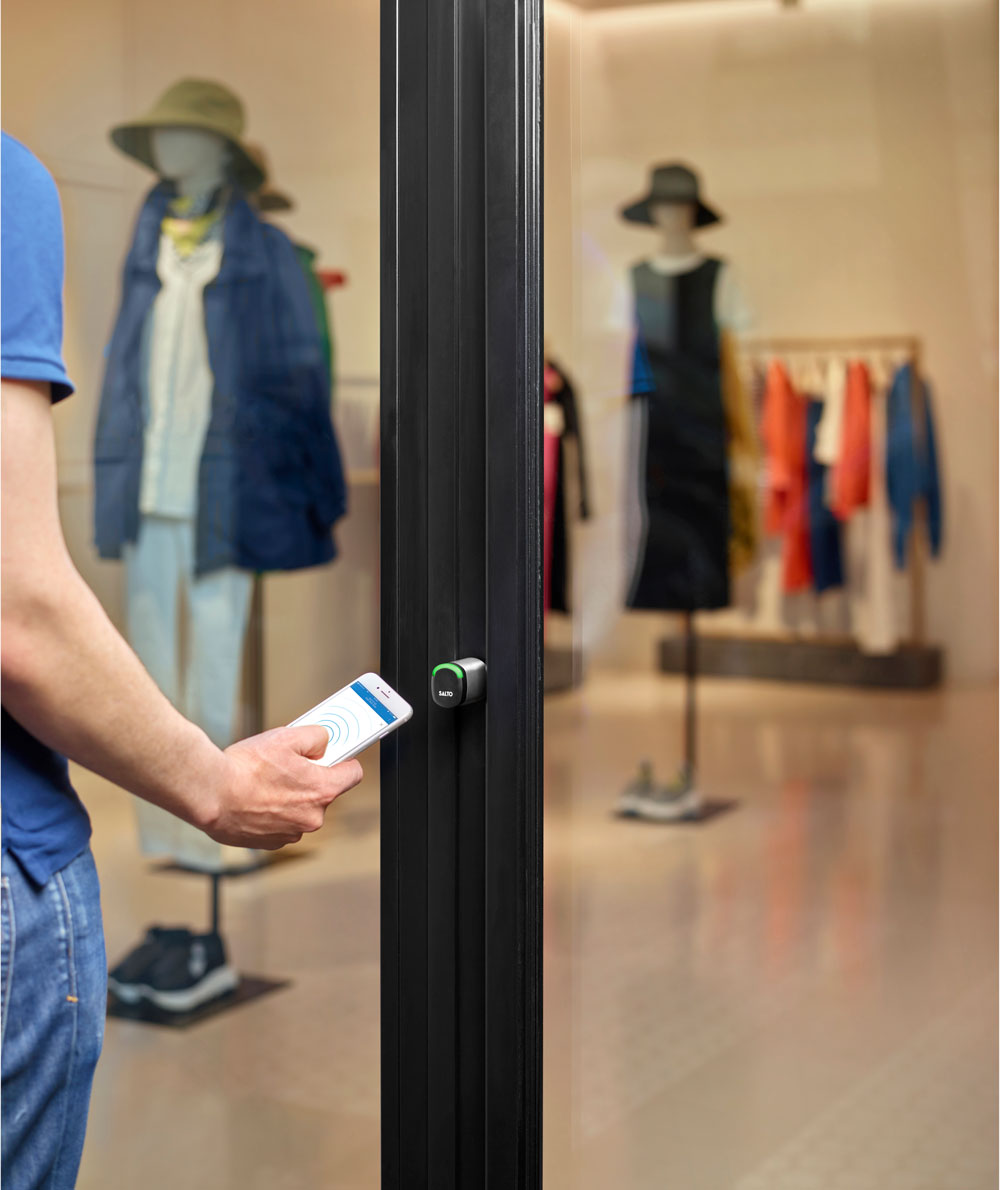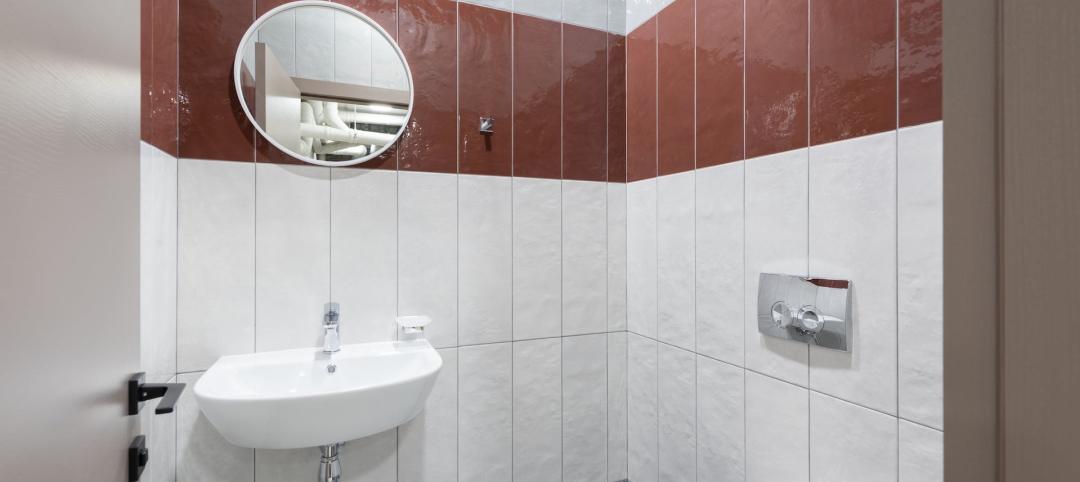“Dark deliveries” is a term that refers to receiving shipments in retail facilities when the store is closed or minimally staffed. “This can happen late at night, early in the morning, or when the retail operation is outside its peak activity mode,” says John Wright, Retail & Fitness Industry Business Leader at SALTO Systems.
While dark deliveries aren’t a new concept, they’ve recently gained more attention due to the increase in e-commerce and the need for efficient, round-the-clock operations. Wright notes that the Covid-19 pandemic also increased the trend toward dark deliveries in order to minimize interpersonal contact. “What’s new, however, is the advanced wireless access control technology — like SALTO KS — that makes managing dark deliveries more secure and efficient than ever before,” he adds.
The Basics of Wireless Access Control
One of the important features of wireless access control is how it is able to manage permissions remotely. Retail managers don’t need to be onsite to allow access, and they can specify certain windows of time during which delivery drivers can access the facility, all from a smartphone or computer.
This level of control has multiple benefits. It not only limits delivery access to specific windows of time during off-hours — it records who entered the facility and when. If a security issue should arise, this audit trail is key to investigating it. If unauthorized access should occur or a door is left open, real-time notifications alert management of the breach.
Another important benefit of wireless access control is how easy the system is to install. It doesn’t require expensive wiring and allows for a faster and smoother transition to dark deliveries. And as the retail operation grows, wireless systems are easier to scale up than traditional wired systems. This might involve additional retail locations, storage facilities or loading docks.
How Wireless Access Works
Wireless access control is managed remotely in the cloud. Access permissions are configured through a centralized management platform, usually accessible through a web browser or mobile app. This enables management to adjust permissions as necessary from anywhere at any time.
Entry to the facility can be scheduled for specific hours. However, should a delivery driver arrive at an unscheduled time, temporary access can be granted. For one-time or infrequent drivers, temporary access codes can be issued which expire after a set period of time. In an emergency situation, doors can be instantly locked or unlocked from the management platform, allowing for a quick response.
Security is an important feature of wireless access control. It can be set up to require multi-factor authentication, necessitating a second form of verification to enter the facility. Additional security is also provided through advanced encryption applied to the data collected by the system. “This ensures that information like access codes and logs are secure from cyberthreats,” says Wright. He notes that wireless access control can also integrate with other security systems, like closed-circuit TV, alarms and inventory control systems, becoming an integral part of a comprehensive security strategy.
Because the locks are battery-operated, they are easy to install and maintain, requiring no wiring. Battery life can be monitored remotely, ensuring the locks are always operational.
Real Benefits
Wireless access control reduces shrinkage, says Wright. “One of the primary areas where retailers experience losses is through shrinkage, which includes theft, fraud and inventory errors. Wireless access control helps by strictly regulating who has access to inventory areas, thereby reducing opportunities for theft.” The audit trails provided by the wireless systems makes it easy to track who has been where and when. This increases accountability among staff and contractors, and deters theft and mishandling of goods.
For retail businesses with compliance concerns, failing to adhere to regulations about who can access certain areas and when they’re permitted to can result in significant fines. Wireless access control monitors facility security and helps retailers avoid these financial penalties.
These systems offer additional financial benefits as well. Insurance premiums may be reduced due to decreased opportunity for theft, and the number of staff required to be on-premises during off-hours to receive deliveries can be reduced.
Other benefits include:
- Reduced risk of litigation by providing evidence in the event of an incident
- Vendor accountability, ensuring that deliveries are being made on time
- Providing cleaning and maintenance crew access during off-hours
- The ability to better manage energy usage, since smart access can be integrated with lighting and climate control systems
- Private shopping appointments for VIP customers
The real benefits of wireless access control can’t be overstated. Having complete control of who enters the retail establishment and when provides additional security, efficiency and financial advantages that mechanical locks simply cannot.
Related Stories
Giants 400 | Feb 5, 2024
Top 40 Entertainment Center, Cineplex, and Theme Park Engineering Firms for 2023
Kimley-Horn, EXP, BRPH Companies, and Alfa Tech Consulting Engineers top BD+C's ranking of the nation's largest entertainment center, cineplex, and theme park engineering and engineering/architecture (EA) firms for 2023, as reported in the 2023 Giants 400 Report.
Giants 400 | Feb 5, 2024
Top 30 Entertainment Center, Cineplex, and Theme Park Architecture Firms for 2023
Gensler, JLL, Nelson Worldwide, AO, and Stantec top BD+C's ranking of the nation's largest entertainment center, cineplex, and theme park architecture and architecture engineering (AE) firms for 2023, as reported in the 2023 Giants 400 Report.
Giants 400 | Feb 5, 2024
Top 40 Entertainment Center, Cineplex, and Theme Park Construction Firms for 2023
ARCO Construction, Turner Construction, Whiting-Turner, PCL Construction Enterprises, and Balfour Beatty US top BD+C's ranking of the nation's largest entertainment center, cineplex, and theme park general contractors and construction management (CM) firms for 2023, as reported in the 2023 Giants 400 Report.
Giants 400 | Feb 5, 2024
Top 60 Shopping Mall, Big Box Store, and Strip Center Construction Firms for 2023
Whiting-Turner, Schimenti Construction, VCC, Ryan Companies US, and STO Building Group top BD+C's ranking of the nation's largest shopping mall, big box store, and strip center general contractors and construction management (CM) firms for 2023, as reported in the 2023 Giants 400 Report.
Giants 400 | Feb 5, 2024
Top 60 Shopping Mall, Big Box Store, and Strip Center Engineering Firms for 2023
Kimley-Horn, Henderson Engineers, Jacobs, WSP, and Wallace Design Collective top BD+C's ranking of the nation's largest shopping mall, big box store, and strip center engineering and engineering/architecture (EA) firms for 2023, as reported in the 2023 Giants 400 Report.
Giants 400 | Feb 5, 2024
Top 90 Shopping Mall, Big Box Store, and Strip Center Architecture Firms for 2023
Gensler, Arcadis North America, Core States Group, WD Partners, and MBH Architects top BD+C's ranking of the nation's largest shopping mall, big box store, and strip center architecture and architecture engineering (AE) firms for 2023, as reported in the 2023 Giants 400 Report.
Retail Centers | Feb 4, 2024
‘Safe bathroom’ technology prevents fatal drug overdoses in public restrooms
‘Safe bathroom’ technology developed by a Massachusetts electrician has been proven to prevent fatal drug overdoses in public restrooms across the country. The systems use ultrasonic and infrared motion sensors connected to timers that detect slight body movements. When a system doesn’t sense motion within a set time period, it raises an alarm alerting emergency medical teams.
Giants 400 | Feb 1, 2024
Top 40 Restaurant Construction Firms for 2023
Swinerton, Shawmut Design and Construction, Gray Construction, CM&B, and Andersen Construction top BD+C's ranking of the nation's largest restaurant general contractors and construction management (CM) firms for 2023, as reported in the 2023 Giants 400 Report.
Giants 400 | Feb 1, 2024
Top 40 Restaurant Engineering Firms for 2023
Kimley-Horn, NV5 Global, Langan, RTM Engineering Consultants, and Henderson Engineers top BD+C's ranking of the nation's largest restaurant engineering and engineering/architecture (EA) firms for 2023, as reported in the 2023 Giants 400 Report.
Giants 400 | Feb 1, 2024
Top 90 Restaurant Architecture Firms for 2023
Chipman Design Architecture, WD Partners, Greenberg Farrow, GPD Group, and Core States Group top BD+C's ranking of the nation's largest restaurant architecture and architecture engineering (AE) firms for 2023, as reported in the 2023 Giants 400 Report.


















